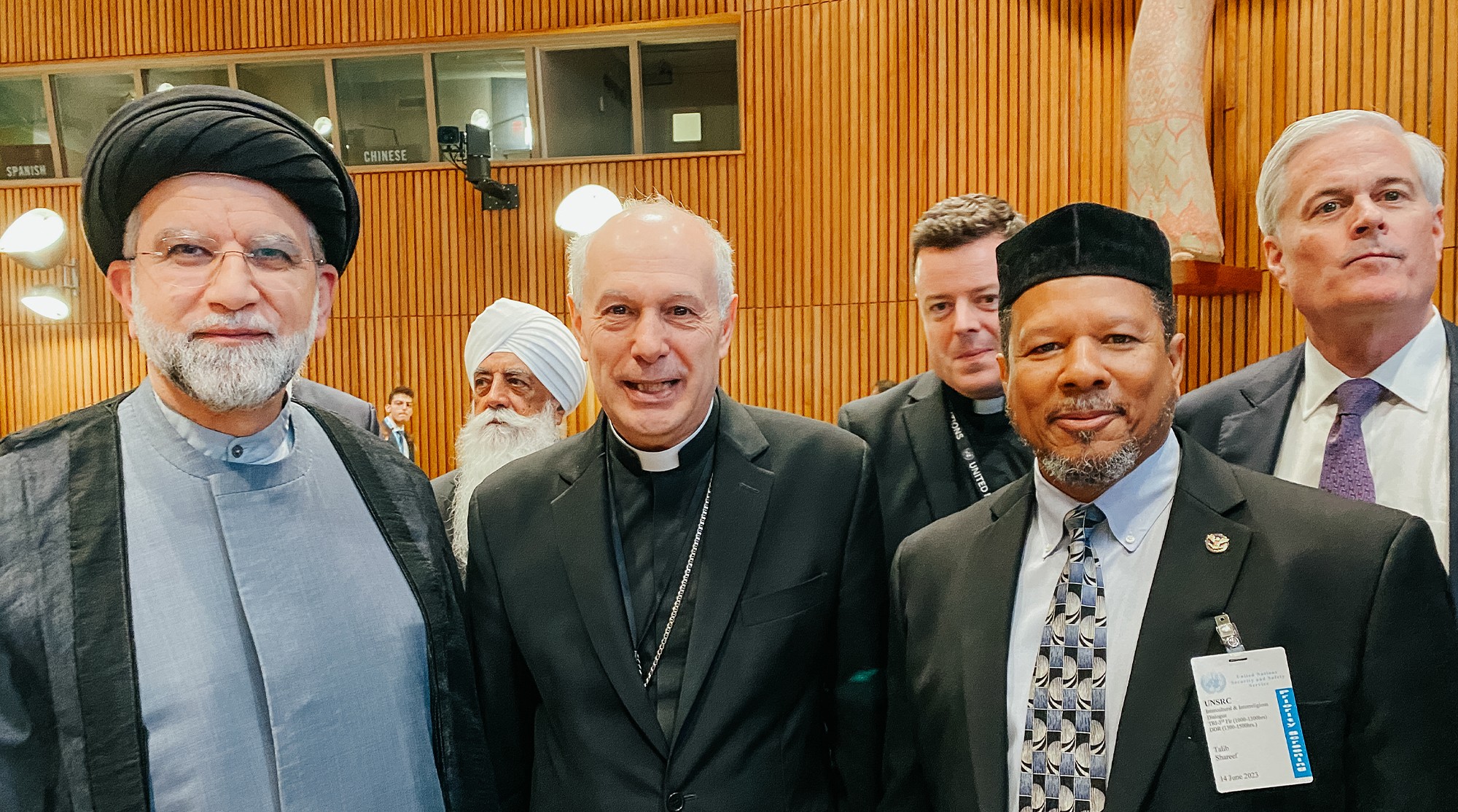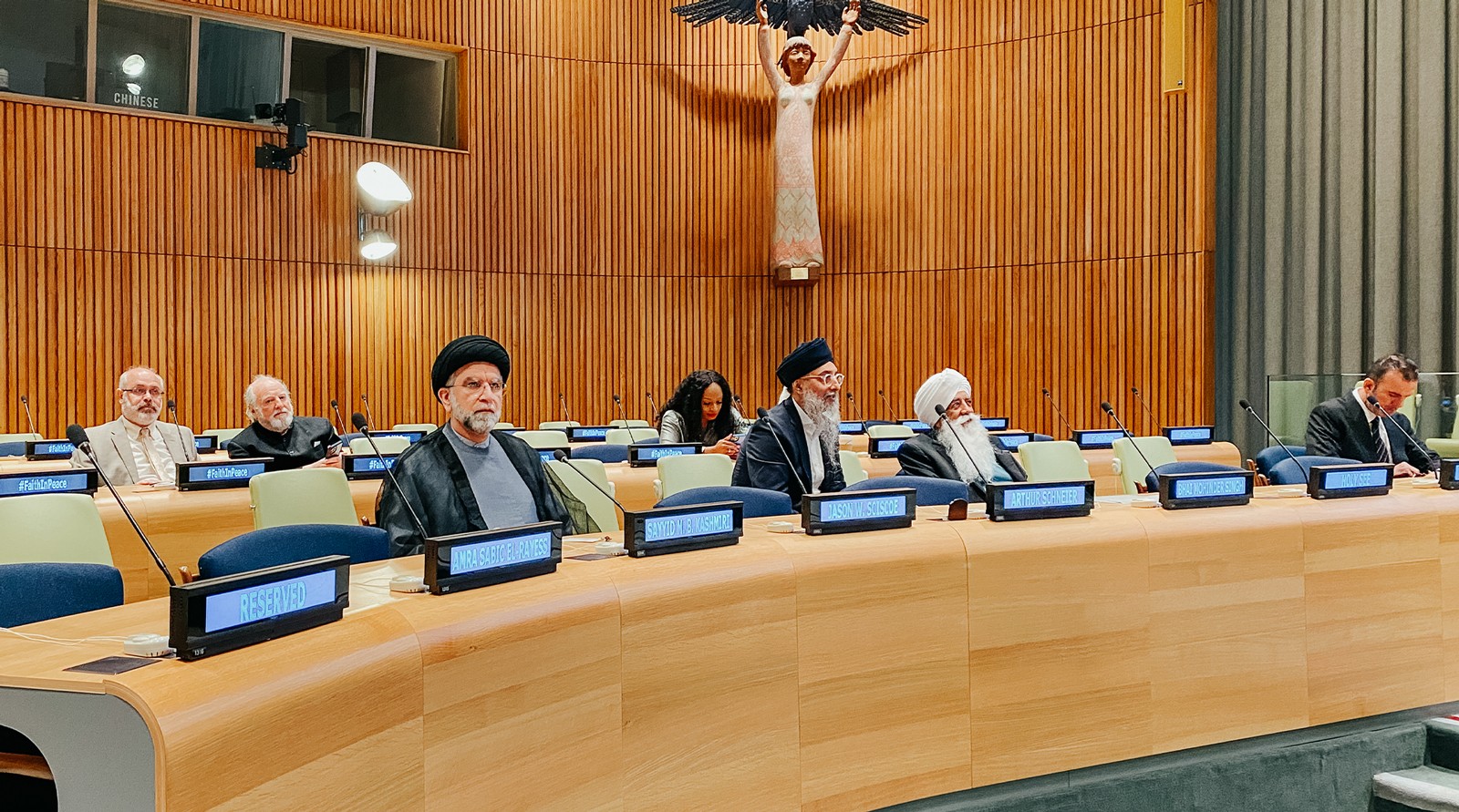“The U.N. Should Have a Religious Advisory Committee” | Sayyid Kashmiri
June 14, 2023 – United Nations Headquarters, New York
A delegation from I.M.A.M. participated in an intercultural and interfaith dialogue and panel discussion on “Building Bridges between East and West.” The event, which took place at the United Nations Headquarters in New York, was attended by many faith leaders and representatives of religious institutions from all over the world. I.M.A.M. was represented by Sayyid M.B. Kashmiri, Representative of Ayatullah Sayyid al-Sistani in North America and Dr. Seyyed Masoud Noori, I.M.A.M.’s Representative to the United Nations.
The event’s discussion concentrated on two points:
- Against the backdrop of current crises and tensions around the globe, where religious, cultural and ethnic differences are misused or serve to justify violence, how can religious leaders counter those attempts and promote mutual understanding, respect of religious and cultural diversity, global unity, and peaceful coexistence? What are the most prominent examples that are worth highlighting?
- How can policymakers, religious, and civil society leaders counter hate speech and other forms of polarization? What are the examples of strategies, programmes and initiatives that demonstrate the use of intercultural and interreligious dialogue to bridge the intercommunal gaps and diffuse polarization in various parts of the world?
Opening his participatory remarks, Sayyid Kashmiri quoted from the Holy Quran: “Cooperate in righteousness and piety” [Quran 5:2] and then discussed three key points:
1. The Importance of Increasing Interfaith and Intercultural Cooperation
In his first point, Sayyid noted: “From time to time we witness, support, and participate in such wonderful meetings with religious leaders in different parts of the world, and it is something good and [even] needed. But, it shouldn’t stop by the end of the event and then we [go] back to our communities and repeat the same habits. My suggestion in order to make these meetings effective and make an impact on the community to bring peace and harmony is to accept each other, visit each other, welcome each other at our [houses of] worship, and take it to the community level so they welcome it and practice it. We shouldn’t just keep it between us with formalities and a private environment.”
He then alluded to the summit of his holiness Pope Francis and Grand Ayatullah Sayyid al-Sistani on March 6, 2021, in an-Najaf, Iraq, as an example on how it brought more peace and harmony between Muslims and Christians.
2. The Need for Special Attention to the Younger Generation
In his second point, Sayyid Kashmiri underscored the importance of focusing on the younger generation, adolescents and youth, male and female, and their exposure to different cultures and religions. By familiarizing them with diverse beliefs and practices, they can become future leaders and decision-makers who contribute to a world founded on mutual respect and understanding. As a practical suggestion, I.M.A.M. expressed its readiness to organize short-term cultural exchange programs. These programs would host groups of high school and university students, as well as junior scholars, from various backgrounds and religions. The aim would be to introduce them to the Muslim way of life, religious values, and facilitate visits to Islamic holy sites. Sayyid Kashmiri encouraged other institutions to collaborate in providing similar opportunities for Muslim students, scholars, and researchers to gain exposure to different cultures, values, beliefs, and religious sites.
3. The Faith Leaders’ Role in the United Nations:
Third, he remarked, “It has been noticed that the United Nations faces critical issues sometimes that entail making a wrong decision or contradicting its charters and statements. In my humble opinion, having such a committee on board could avoid such wrong decisions and contradictions. This committee with its religious and spiritual expertise could be a good supporter of the United Nations.”
Sayyid Kashmiri then supported his proposal in two incidents:
First, the Decision on the ceasefire and peace. It has never been noticed even one time that when the UN makes a decision on war to study it from the eyes of the religious leaders. In fact, religion should not be used by politicians, it is important that politicians should listen and take religious leaders’ advice. If that happens, we may avoid any time of war in the future.
Second, decisions regarding human values and human instinct. For instance, Article 16 of The Universal Declaration of Human Rights (1) indicates that “Men and women of full age, without any limitation due to race, nationality or religion, have the right to marry and to found a family. They are entitled to equal rights as to marriage, during marriage and at its dissolution. Marriage shall be entered into only with the free and full consent of the intending spouses. The family is the natural and fundamental group unit of society and is entitled to protection by society and the State.
This brought a huge concern to so many countries contradicting the CEDAW charter, and it has brought forth a crucial discourse between representatives of different countries.
A religious Advisory Committee at the U.N. board could prevent such matters.
During the event, the I.M.A.M.’s delegation participated in discussions and presentations alongside religious leaders, academics, and representatives from other organizations. I.M.A.M.’s participation in the event contributed to the ongoing dialogue on intercultural and interreligious cooperation. Sayyid Kashmiri’s insights and suggestions highlighted the importance of tangible action plans, intergenerational engagement, and collaboration among diverse institutions to promote mutual understanding, respect, and peaceful coexistence among different communities.
Furthermore, this event was arranged and sponsored by the Muslim World League (MWL), United Nations Alliance of Civilizations (UNAOC), and United Nations Multicultural Study of Faiths of the UN Staff Recreation Council (UNSRC Multicultural Study of Faiths) with the intention to address the increasing instances of discrimination, intolerance, and violence targeting religious, ethnic, and other communities worldwide. Various forms of prejudice, including Islamophobia, antisemitism, and Christianophobia, pose significant challenges to human rights and international law. Religious and cultural leaders, both state and non-state actors, play a crucial role in promoting dialogue and understanding among different religious groups, fostering peaceful and inclusive societies.
References:
1- [https://www.un.org/en/about-us/universal-declaration-of-human-rights]




Leave a Comment:
You must be logged in to post a comment.